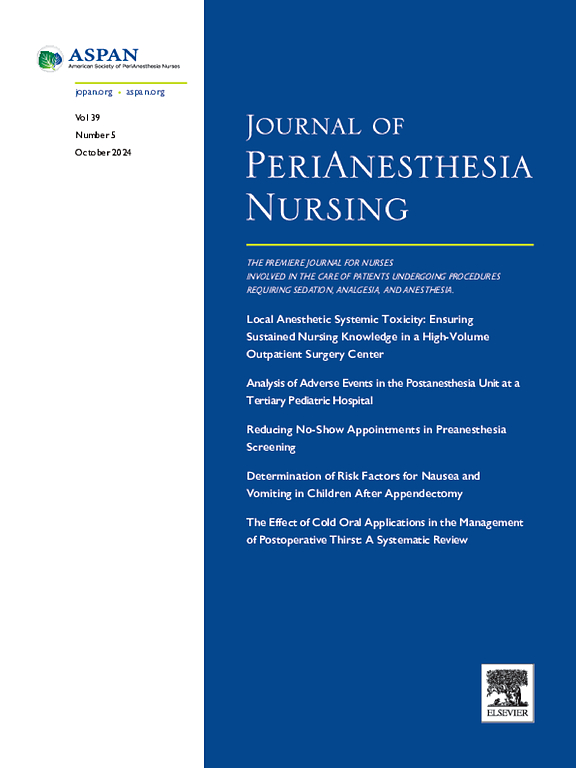Risk Factors Related to Postoperative Dizziness Among Patients Who Underwent General Anesthesia and Intraoperative Analgesics: A Prospective Cohort Study
IF 1.6
4区 医学
Q2 NURSING
引用次数: 0
Abstract
Purpose
To describe postoperative dizziness for patients who received analgesics during general anesthesia and to investigate the factors related to the trend of dizziness within 3 days after surgery.
Design
A prospective cohort study.
Methods
This is a longitudinal study. The severity of dizziness was assessed from the day of the surgery until the third day post surgery. Generalized estimation equation models were created to determine the predictive effect of each independent variable separately.
Findings
After surgery, the incidence of dizziness was 42.1%. Approximately 10% of participants experienced severe dizziness. Participants with postoperative nausea and vomiting were more likely to experience postoperative dizziness. In addition, age, education level, history of motion sickness, surgical specialties, laparoscopic surgery, and long-acting analgesic use had an impact on the trend of postoperative dizziness. More than 25% of participants who used long-acting analgesics experienced dizziness on the third postoperative day.
Conclusions
Postoperative dizziness was common among participants who received analgesics during general anesthesia. Monitoring for postoperative dizziness may need to be prolonged, especially in patients taking long-acting analgesics. For patients at high risk for postoperative dizziness, preventive measures such as adjusting analgesic and anesthetic medications may be necessary.
接受全身麻醉和术中镇痛的患者术后头晕的相关风险因素:一项前瞻性队列研究。
目的:描述在全身麻醉期间接受镇痛剂的患者术后头晕的情况,并调查与术后 3 天内头晕趋势相关的因素:方法:这是一项纵向研究:这是一项纵向研究。方法:这是一项纵向研究,从手术当天到术后第三天对头晕的严重程度进行评估。建立了广义估计方程模型,分别确定每个自变量的预测效果:手术后,头晕发生率为 42.1%。约有 10% 的参与者出现严重头晕。术后恶心和呕吐的参与者更容易出现术后头晕。此外,年龄、教育程度、晕车史、手术专业、腹腔镜手术和长效镇痛药的使用也对术后头晕的趋势有影响。超过25%使用长效镇痛药的参与者在术后第三天出现头晕症状:结论:术后头晕在全身麻醉期间接受镇痛的参与者中很常见。对术后头晕的监测可能需要延长,尤其是服用长效镇痛药的患者。对于术后头晕的高危患者,可能需要采取预防措施,如调整镇痛和麻醉药物。
本文章由计算机程序翻译,如有差异,请以英文原文为准。
求助全文
约1分钟内获得全文
求助全文
来源期刊

Journal of Perianesthesia Nursing
NURSING-
CiteScore
2.20
自引率
17.60%
发文量
279
审稿时长
90 days
期刊介绍:
The Journal of PeriAnesthesia Nursing provides original, peer-reviewed research for a primary audience that includes nurses in perianesthesia settings, including ambulatory surgery, preadmission testing, postanesthesia care (Phases I and II), extended observation, and pain management. The Journal provides a forum for sharing professional knowledge and experience relating to management, ethics, legislation, research, and other aspects of perianesthesia nursing.
 求助内容:
求助内容: 应助结果提醒方式:
应助结果提醒方式:


